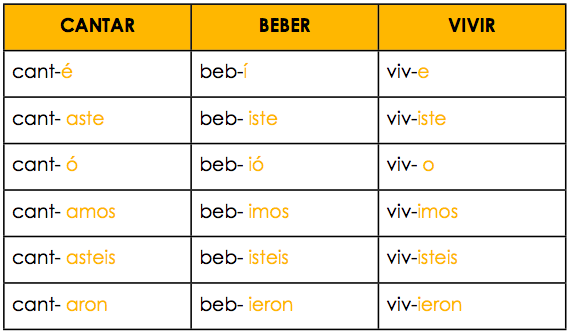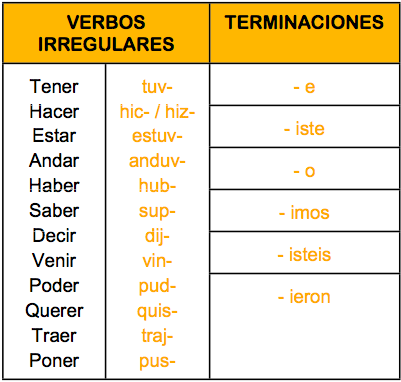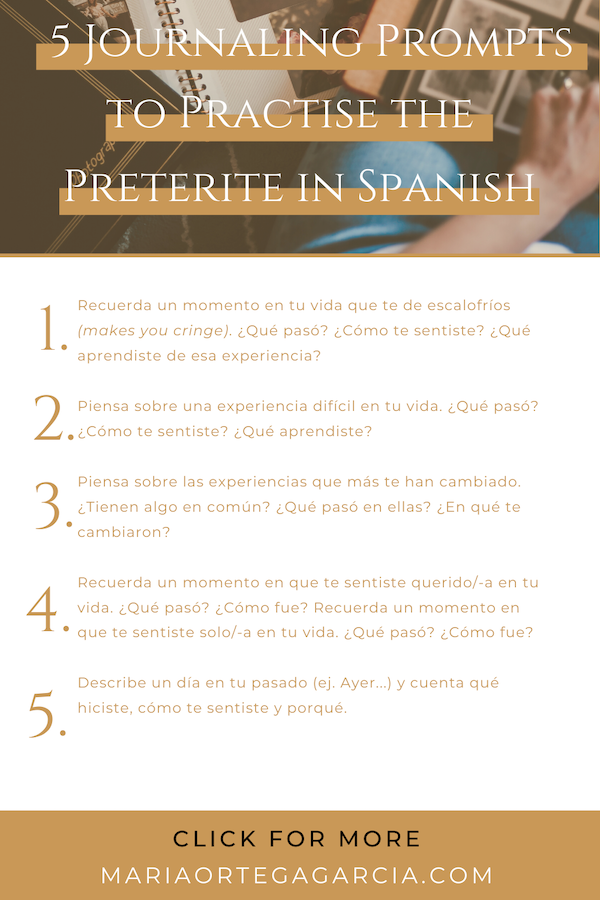A few days ago, a follower of my Facebook page asked me for help with his personal nightmare in Spanish. For him, the irregular verbs in the Pretérito Indefinido (Past Tense) were just something he couldn’t understand, so he wrote me a few lines asking me for some tips. As this week, I also had a class with one of my students, working on the same topic, I decided I was going to spend some time answering all your prayers about the irregularities of the verbs in the Pretérito Indefinido in Spanish.
The past tense has many names in Spanish. It is called “pretérito”, “pretérito indefinido”, “indefinido”, “pasado simple”… I will call it Indefinido.
This tense is used to talk about the past in Spanish. We used to talk about actions accomplished in a particular moment in the past.
– El año pasado mis padres y yo nos mudamos a nuestra nueva casa. – Last year, my parents and I moved to our new house.
So, the action (mudarse = ‘to move’) was accomplished, finished in an specific time in the past (el año pasado = ‘last year’). We also use the pretérito indefinido to express an action that happens in the past, occurs in the middle of other action.
– Justo cuando estábamos pasándolo mejor, tuvo que irse. – Right when we were having more fun, he had to go.
As you can see, there are two actions: one extended in time (pasarlo bien = ‘have fun’) and one that happens in the middle of the previous one (tener que irse = ‘have to go’). In those cases, the action that happens in the middle of another action goes in pretérito indefinido.
How to Form the Regular Indefinido
To conjugate a regular verb in the “Indefinido”, you just need to drop the endings -ar, -er or -ir from the infinitive form and add the endings.

How to Form the Irregular Indefinido
Unfortunately there are quite a few irregular verbs in this tense. Verbs with an irregular root:

Note!!! Traer and Decir drop the “-i-“. In the form of they (ellos, ellas) we say “trajeron” and “dijeron”
Some more irregularities
- Verbs ending by -ducir in the infinitive (like “producir”, “conducir”, “traducir”) C > J
The “c” in the root becomes “j”.
– Conducir: Conduje, condujiste, condujo, condujimos, condujisteis, condujeron.
- Verbs that have an “-i-” between vowels with the verbs that en in “-er” and “-ir” in the infinitive, change the “i” for a “y” in the 3rd person of the singular (he/she) and of the plural (they). I > Y
– Leer: Le-ió > Leyó / Le-ieron > Leyeron – Contruir: Construyó / Construyeron – Oir: Oyó / Oyeron
- Verbs ending by -zar in the infinitive (empezar, comenzar, cazar…) Z > C
The “z” becomes “c” only in the 1st person singular (yo).
– Empezar: Empecé, empezaste, empezó, empezamos, empezasteis, empezaron.
- Verbs ending by -car in the infinitive (sacar, aparcar…) C > QU
The “c” in the rot becomes “qu” for the 1st person singular (yo).
– Sacar: Saqué, sacaste, sacó, sacamos, sacasteis, sacaron.
- Verbs ending by -gar (llegar, jugar…) G > GU
The “g” in the root becomes “gu” in the 1st singular (yo).
– Llegar: Llegué, llegaste, llegó, llegamos, llegasteis, llegaron.
- Verbs whose root end by “-ll” and “-ñ” (bullir, tañer…) won’t have the “i” in the 3rd person of singular and plural.
– Bullir: Bulló (not bullió) / Bulleron
- Some verbs ending by “-er” and “-ir” in the infinitive change their vowel (E > I // O > U) in the 3rd person singular and plural. They are the same that change their vowel in the present of indicative (irregular verbs in the Present).
– Pedir: Pedí, pediste, pidió, pedimos, pedisteis, pidieron. – Dormir: Dormí, dormiste, durmió, dormimos, dormisteis, durmieron.
Laura Tavares has created a nice presentation with more details and examples of the Indefinido irregularities and some practical exercises. If you like infographics, Spanish & Valencia and Español Online have a nice one with endings and some commonly used irregularities.
So, yes, I understand, there are a lot of irregular verbs to memorize. There may be even more irregular verbs in Indefinido than regular ones.
And this brings me to the next question. How do I master the irregular verbs in the Indefinido??? I am glad you asked. Keep reading.
How to remember the Irregular Preterite (Indefinido)
- Choose 5 irregular verbs according to your own needs.
What do I mean by that? We tend to use the same words in our mother language over and over, so identify those verbs you are constantly using. Make a list.
- Write a whole sentence containing each irregular verb in the Indefinido.
This is a very helpful way to remember vocabulary because you are using your own words to put this form in context.
- Journal using those 5 verbs in your entry at least once.
Journaling in the target language is one of the best ways I know to anchor, fix, the language in your memory.
Journaling Questions to Practise the Indefinido
Below you can find 5 journaling prompts to practice the Pretérito Indefinido in Spanish.
Editor’s Note: This post was originally posted in October 2013 and has been updated June 2020 with the last two sections for comprehensiveness.
If you want to delve deeper into the Pretérito Indefinido in Spanish, you can take one of my simple self-paced online courses such as the Spanish Past Tenses Masterclass which includes:
a) pre-recorded videos
b) workbooks / texts
c) tasks



